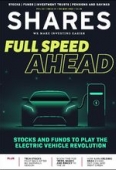Archived article
Please note that tax, investment, pension and ISA rules can change and the information and any views contained in this article may now be inaccurate.
Five things UK investors can learn from Warren Buffett

‘Woodstock for capitalists’, aka the Berkshire Hathaway annual shareholder meeting, took place on 1 May, and tens of thousands of investors across the globe tuned into the livestream to hear some pearls of wisdom from Berkshire’s chairman and chief executive, Warren Buffett.
He is well known for a focus on value investing, for the long term, in businesses with wide economic moats. But as you might expect for the world’s most famous investor, there are other nuggets of wisdom that have been dropped along the way which UK investors can use to their advantage.
1. DON’T ‘DIWORSIFY’
Buffett says, ‘Diversification is protection against ignorance’ and ‘makes little sense for those who know what they’re doing.’
It’s clear that Buffett does practice diversification to some extent, but he also invests with conviction.
UK investors should be wary of ‘diworsification’ in their portfolios, particularly from closet tracker funds which hug an index and charge active fees for doing so.
These funds are long term destroyers of wealth and should be weeded out in favour of low-cost tracker funds or truly active funds.
Buffett’s point is that if you are going to invest selectively, you should know enough to do it with conviction, and that is something UK investors should demand from their active funds.
If your fund is diversified across most stocks in the market and is charging fees for active management, it’s probably time to vote with your feet.
2. BEWARE CRYPTOCURRENCIES
Buffett doesn’t like cryptocurrencies, and believes bitcoin has no intrinsic value. He has reportedly called bitcoin ‘rat poison squared’ and stated in 2018 that cryptocurrencies ‘will come to a bad ending’. This is an extreme view, but such is the nature of investing in cryptocurrency that extremes, both bad and good, must be counted as distinctly possible outcomes.
Investors who do decide to invest in cryptocurrency should therefore only do so with a small part of their overall portfolio they are willing to lose.
3. USE TRACKERS
Buffett’s advocacy of tracker funds is another curiosity and doesn’t on the face of it make a lot of sense for a man who’s made a fortune through active money management.
In the 2016 Berkshire Hathaway report Buffett wrote ‘when trillions of dollars are managed by Wall Streeters charging high fees, it will usually be the managers who reap outsize profits, not the clients. Both large and small investors should stick with low-cost index funds.’
The point is well made, albeit by an active manager, and UK investors today have a wealth of low-cost passive funds which can serve as the basic building blocks of a portfolio.
In general, active managers might not be able to beat the market, but there are some exceptional fund managers who have demonstrated an ability to outperform over the long term.
UK investors don’t need to choose exclusively between active and passive approaches, and it would generally be sensible to have a mix of both in their portfolios.
4. ROLL UP DIVIDENDS
Buffett likes to receive dividends, but Berkshire Hathaway doesn’t pay one. As he wrote in 2013: ‘A number of Berkshire shareholders…. would like Berkshire to pay a cash dividend. It puzzles them that we relish the dividends we receive from most of the stocks that Berkshire owns, but pay out nothing ourselves.’
Part of the rationale is that Buffett has plenty of opportunities to reinvest the dividends he receives within his portfolio, unlike the companies paying the dividend, which are generally limited to the industries they operate in.
UK investors are in the same boat as Buffett on this one. The dividends they receive from their holdings can be reinvested in the same funds and companies that generate them, or reallocated elsewhere in the portfolio, to top up existing positions, or establish new ones.
The long-term benefits of rolling up dividends is clear, particularly when investing in a market as high yielding as the UK. Over the past 20 years, the FTSE All-Share has returned 39% without dividends included, and 178% with dividends reinvested.

5. GROWTH AND VALUE ARE ‘JOINED AT THE HIP’
Buffett is well known for being a value investor, a style that has been out of favour for the last 10 years (until recently), and which is commonly contrasted with growth investing.
But as Buffett remarks in his 1992 chairman’s letter, ‘the two approaches are joined at the hip. Growth is always a component in the calculation of value.’
This explains how a so-called value investor like Buffett comes to own a large chunk of Apple, a tech stock more commonly associated with a growth investment style. Buffett’s point is that to arrive at an estimate of the intrinsic value of a company, you need to understand its growth prospects.
Buffett’s perspective suggests that value and growth are not mutually exclusive at a stock level, and extrapolating somewhat, nor are they at a fund manager level.
There is a spectrum, with some stocks exhibiting higher levels of value characteristics, and others more growth characteristics. Likewise, most fund managers incorporate both value and growth considerations to different extents, though they ultimately end up being characterised as growth or value investors.
Growth investor Terry Smith follows the mantra ‘buy good companies, don’t overpay, do nothing’. The Fundsmith principle of not overpaying clearly speaks to some consideration of value, alongside an analysis of the quality of the underlying business.
Growth and value factors can each be expected to have their day in the sun, and indeed, the outperformance of one compared to the other can last for a long time. Investors should have a blend of styles along the value and growth spectrum, so that whichever way the wind is blowing, their portfolio is making ground.
Important information:
These articles are provided by Shares magazine which is published by AJ Bell Media, a part of AJ Bell. Shares is not written by AJ Bell.
Shares is provided for your general information and use and is not a personal recommendation to invest. It is not intended to be relied upon by you in making or not making any investment decisions. The investments referred to in these articles will not be suitable for all investors. If in doubt please seek appropriate independent financial advice.
Investors acting on the information in these articles do so at their own risk and AJ Bell Media and its staff do not accept liability for losses suffered by investors as a result of their investment decisions.
Issue contents
Feature
Great Ideas
- Convatec shares start moving up after it hits half a billion of sales in first quarter
- Google parent Alphabet is a class investment right under your nose
- Stick with Yamana Gold despite share price weakness
- Multi-bagger potential for digital star Panoply
- Jupiter Green: small caps are the best place to make money with the ‘E’ of ESG
- This small cap pick has delivered an eye-popping early return
 magazine
magazine








